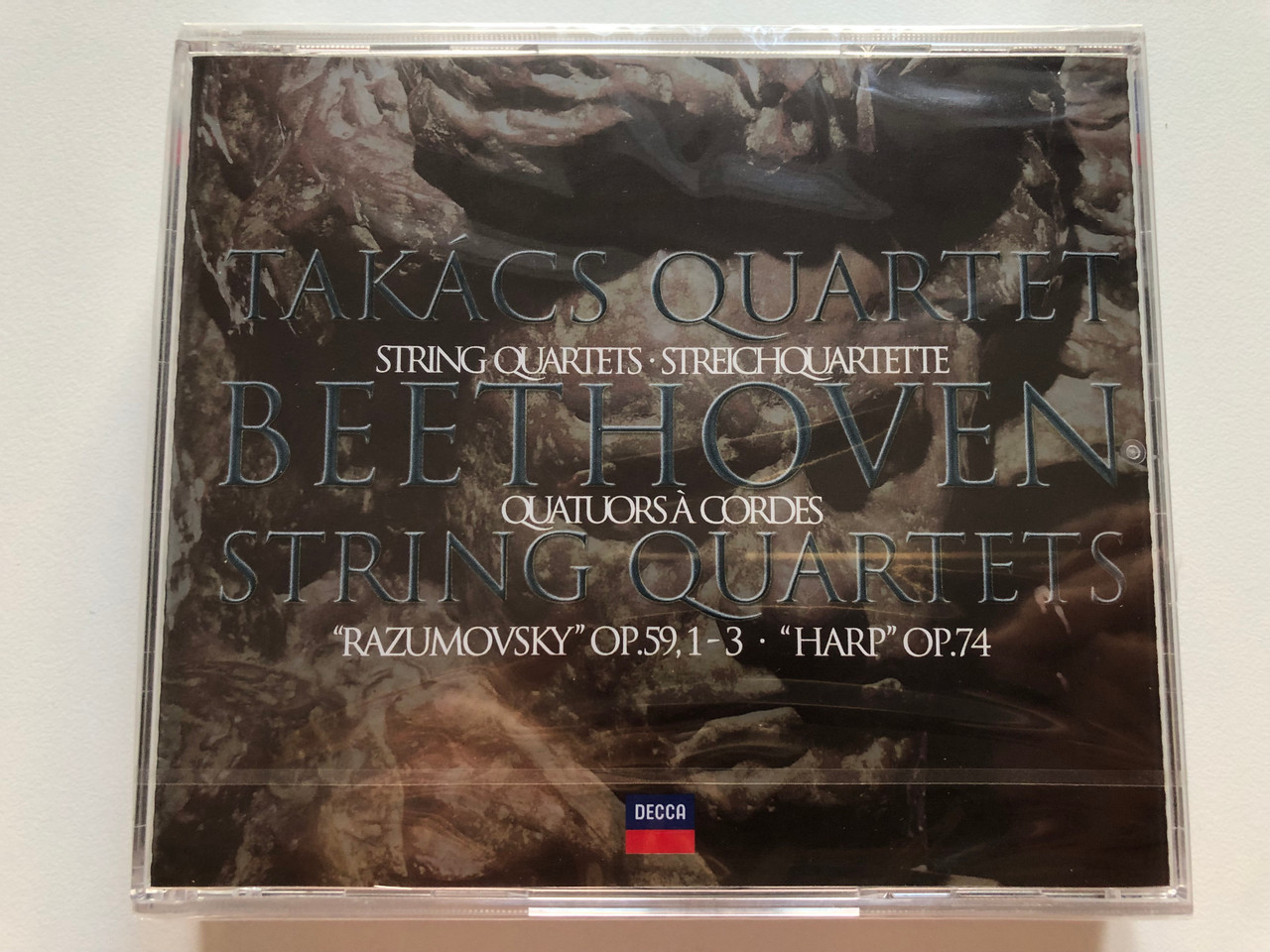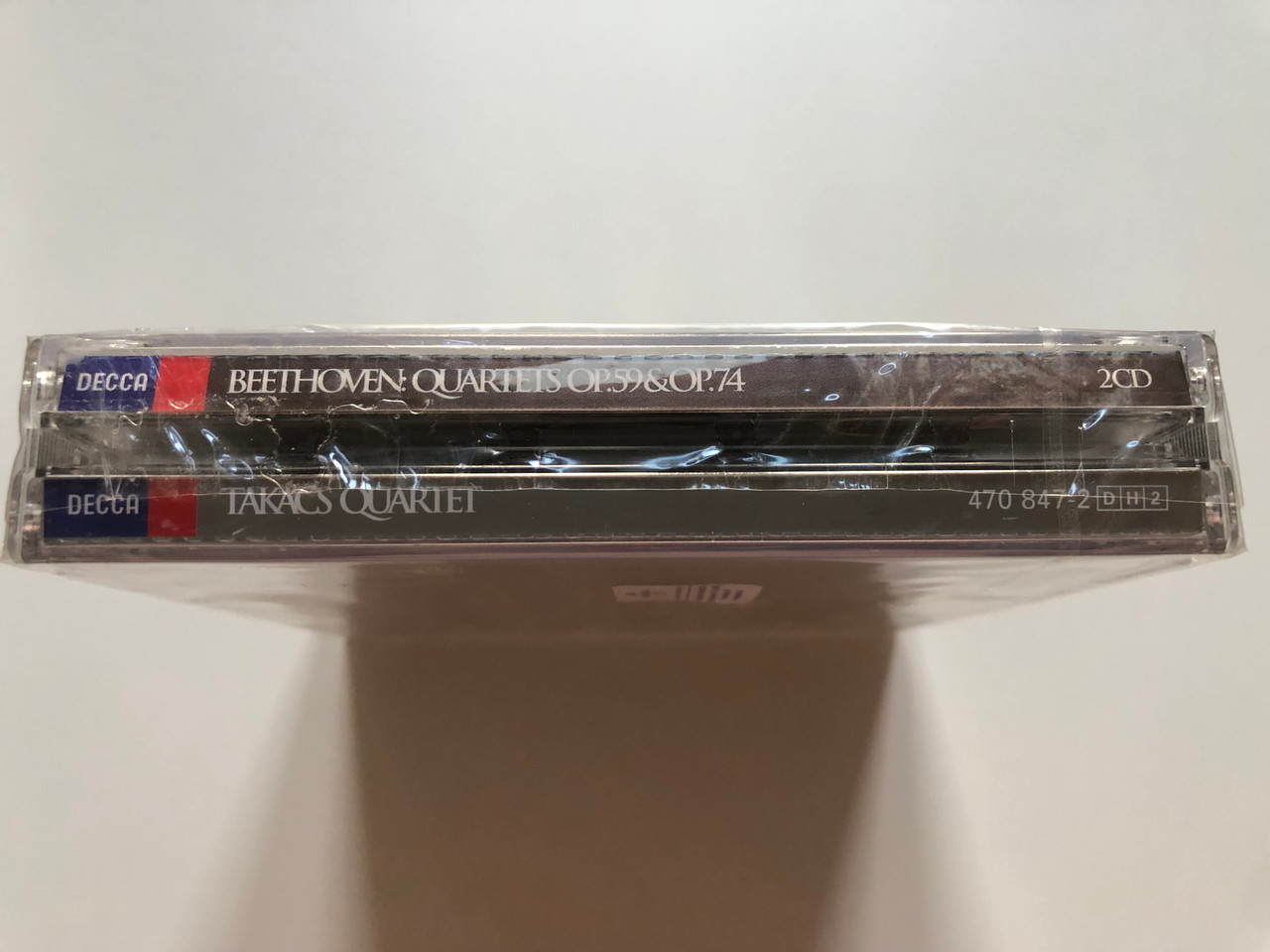Description
Beethoven - Takács Quartet – String Quartets/Streichquartette/Quatuor À Cordes "Razumovsky" Op.59, 1 - 3 ∙ "Harp" Op.74 / Decca Music Group Audio CD 2002
UPC 028947084723
Having toured the world with its Beethoven Quartets cycle as the old millennium entered the new, the Takács Quartet now commits some of them to disc. This two-CD set from Decca includes the three Razumovsky quartets, Op. 59, of 1806, and the Harp Quartet, Op. 74, sometimes known as the Lobkowitz after its dedicatee, composed in 1809. Although the latter's presto yields the fastest version of the fate motif Beethoven ever wrote, it is possible to go too quickly, as the Takács does here, making triplets of the first notes, which are not written as such. The speed of the dazzling finale of the Razumovsky No. 3 is impressive, but just fails to grip as firmly as a slightly slower, more controlled performance might.
On the other hand, the Thème Russe last movement of the Razumovsky No. 1 is a model of restraint, the playful parts entering from all angles with delightful measured precision, polished and perfect. The Takács' music breathes as if in a meditative trance the broad, shallow arch of the molto adagio, which lasts a satisfying quarter-hour in Razumovsky No. 2. The four play best what is calculated and intricate, like the theme and variations that conclude the Harp Quartet, giving each episode a distinct flavor. Variety is more important than usual on one-composer recordings such as this, and the members of the Takács Quartet prove themselves contemplative Beethovenians, who occasionally mistake the gallop for a stampede. --Rick Jones
The Takacs Quartet begin in the middle of what is to be a complete set of the Beethoven string quartets. The Takacs had enjoyed nearly 20 years of increasing international success before, in the mid-1990s, Gabor Takacs, their founder and leader, died, to be replaced by Edward Dusinberre; and two years later Roger Tapping became the viola player. Since then, the reconstituted ensemble has won new laurels, notably with their 1998 set of the Bartok quartets (also on Decca). And on the evidence of these two discs, this is going to be a very desirable Beethoven cycle. The playing is of the highest standard: exuberant, yet also alive to the softest, tenderest gradations; tempos are well chosen and finely sustained; there is a strong sense of direction; all four musicians are equally adept at taking the lead and slipping into an accompanimental role. And so expert is their unanimity that I was surprised by a tiny flaw in ensemble 2'58" into the Molto adagio of the Eighth Quartet, otherwise played with such masterly control of shape and emotion. There are innumerable highlights, but these deeply considered readings are marked above all by integrity of purpose and achievement. The very different challenges of the four quartets are met boldly, the quirky nature of the Harp as confidently brought off as is the immense stature of the first Rasumovsky and the elusive nature of the second in E minor.The catalogue lists a bewilderingly large choice. Anyone wishing to acquire these four works, without commitment to Decca's new venture, would be well served by the Tokyo Quartet or, at mid-price, Quartetto Italiano (both of these are three-disc issues and include Op. 95). The Lindsays' two-disc set of the three Rasumovskys has all the vibrant life and depth one would expect. The recorded quality is high, with clarity of placement and full dynamic range naturally conveyed (though cello pizzicatos in the slow movement of the Ninth are perhaps over-prominent). I did feel initially that the broad, empty acoustic might be a problem, but the marked resonance doesn't take the edge off the composer's characteristic sudden silences. Future issues in this series will be keenly awaited this promises to be among the very finest complete Beethoven quartet cycles. Peter Branscombe -- From International Record Review
| Country: | Europe |
|---|---|
| Released: | 2002 |
| Genre: | Classical |
| Style: | Classical, Romantic |
Tracklist:
| Quartet In F Major, Op.59 No.1 | |||
| 1-1 | I Allegro | 10:12 | |
| 1-2 | II Allegretto Vivace E Sempre Scherzando | 8:17 | |
| 1-3 | III Adagio Molto E Mesto – | 13:19 | |
| 1-4 | IV Thème Russe: Allegro | 7:44 | |
| Quartet In E Flat Major, Op.74 | |||
| 1-5 | I Poco Adagio – Allegro | 9:39 | |
| 1-6 | II Adagio Ma Non Troppo | 10:53 | |
| 1-7 | III Presto – Più Presto Quasi Prestissimo – | 4:50 | |
| 1-8 | IV Allegretto Con Variazioni | 6:15 | |
| Quartet In E Minor, Op.59 No.2 | |||
| 2-1 | I Allegro | 13:26 | |
| 2-2 | II Molto Adagio | 14:56 | |
| 2-3 | III Allegretto – Maggiore (Thème Russe) | 6:28 | |
| 2-4 | IV Finale: Presto | 5:26 | |
| Quartet In C Major, Op.59 No.3 | |||
| 2-5 | I Introduzione: Andante Con Moto – Allegro Vivace | 10:38 | |
| 2-6 | II Andante Con Moto Quasi Allegretto | 10:10 | |
| 2-7 | III Menuetto (Grazioso) – | 4:54 | |
| 2-8 | IV Allegro Molto | 5:56 |
- Phonographic Copyright ℗ – Decca Music Group Limited
- Copyright © – Decca Music Group Limited
- Copyright © – Steve J. Sherman
- Recorded At – St George's, Bristol
- Art Direction – Mark Millington (2)
- Cello – András Fejér
- Composed By – Ludwig van Beethoven
- Editor [Recording Editor] – Emma Stocker
- Engineer [Balance Engineer] – Simon Eadon
- Ensemble – Takács Quartet
- Liner Notes – Misha Donat, Takács Quartet
- Liner Notes [French Translation] – Benoit André
- Liner Notes [German Translation] – Andreas Klatt (2)
- Photography By – Steve J. Sherman
- Producer [Recording Recording] – Andrew Keener
- Viola – Roger Tapping
- Violin – Edward Dusinberre, Károly Schranz


























